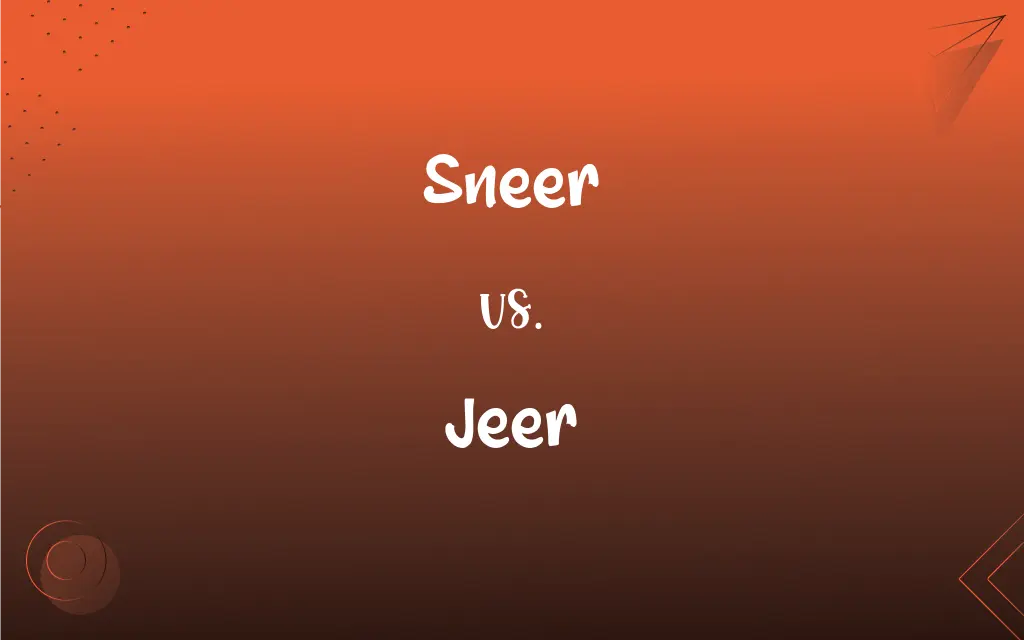Sneer vs. Jeer: What's the Difference?
By Harlon Moss & Janet White || Updated on May 22, 2024
Sneer is a facial expression showing contempt or scorn, while jeer is a verbal expression mocking or ridiculing someone.

Key Differences
Sneer involves a facial expression or tone of voice that conveys disdain or contempt. It often includes a slight curling of the lip and a derisive attitude. Sneering can be both subtle and overt, used to undermine or belittle someone without necessarily using words. Jeer, on the other hand, is a vocal expression of mockery or derision. It involves shouting or speaking in a scornful manner, often in a group setting, to openly ridicule someone. Jeering is typically louder and more aggressive than sneering, aiming to publicly embarrass or humiliate the target.
Sneering can occur in more private or individual contexts, where a look or a tone is enough to convey scorn. Jeering is usually more public and collective, often seen at events like sports games or public speeches where crowds express disapproval or mockery loudly.
While sneering can be a more controlled and subtle way of showing disdain, jeering is more blatant and can escalate tensions quickly due to its confrontational nature.
Comparison Chart
Definition
Facial expression showing contempt
Verbal mockery or ridicule
Nature
Subtle, non-verbal
Loud, verbal
ADVERTISEMENT
Context
Individual or private
Public or group settings
Expression
Often involves a curled lip
Involves shouting or speaking loudly
Intention
To show disdain subtly
To embarrass or ridicule openly
Sneer and Jeer Definitions
Sneer
Non-verbal expression of superiority.
The sneer on his face was unmistakable as he dismissed the idea.
Jeer
Verbal expression of mockery.
The crowd jeered at the losing team.
ADVERTISEMENT
Sneer
Facial expression indicating scorn.
He gave a sneer of contempt when he saw the proposal.
Jeer
Shouting or speaking in a scornful manner.
He was jeered off the stage by the hostile audience.
Sneer
Often involves a slight curling of the lip.
His sneer was accompanied by a subtle lift of his lip.
Jeer
Public ridicule to embarrass.
The protesters jeered at the politician during his speech.
Sneer
Tone of voice that conveys disdain.
Her sneering tone made everyone uncomfortable.
Jeer
Aimed at humiliating or deriding.
She couldn't ignore the jeers from the back of the room.
Sneer
Used to belittle or undermine subtly.
She responded with a sneer, undermining his confidence.
Jeer
To speak or shout derisively; mock.
Sneer
A scornful facial expression characterized by a slight raising of one corner of the upper lip.
Jeer
To abuse vocally; taunt
Jeered the speaker off the stage.
Sneer
A scornful tone or statement.
Jeer
A scoffing or taunting remark or shout.
Sneer
To assume a scornful or derisive facial expression.
Jeer
A mocking remark or reflection.
Sneer
To speak in a scornful or derisive manner.
Jeer
(nautical) A gear; a tackle.
Sneer
To utter with a sneer or in a sneering manner.
Jeer
An assemblage or combination of tackles, for hoisting or lowering the yards of a ship.
Sneer
(intransitive) To raise a corner of the upper lip slightly, especially in scorn
Jeer
To utter sarcastic or mocking comments; to speak with mockery or derision; to use taunting language.
Sneer
(transitive) To utter with a grimace or contemptuous expression; to say sneeringly.
To sneer fulsome lies at a person
"Now here's someone who should attend privilege workshops," sneered she.
Jeer
To mock; treat with mockery; to taunt.
Sneer
A facial expression where one slightly raises one corner of the upper lip, generally indicating scorn.
Jeer
A gear; a tackle.
Sneer
A display of contempt; scorn.
Jeer
A railing remark or reflection; a scoff; a taunt; a biting jest; a flout; a jibe; mockery.
Midas, exposed to all their jeers,Had lost his art, and kept his ears.
Sneer
To show contempt by turning up the nose, or by a particular facial expression.
Jeer
To utter sarcastic or scoffing reflections; to speak with mockery or derision; to use taunting language; to scoff; as, to jeer at a speaker.
But when he saw her toy and gibe and jeer.
Sneer
To inssinuate contempt by a covert expression; to speak derisively.
I could be content to be a little sneared at.
Jeer
To treat with scoffs or derision; to address with jeers; to taunt; to flout; to mock at.
And if we can not jeer them, we jeer ourselves.
Sneer
To show mirth awkwardly.
And sneers as learnedly as they,Like females o'er their morning tea.
Midas, exposed to all their jeers,Had lost his art, and kept his ears.
The fop, with learning at defiance,Scoffs at the pedant and science.
Jeer
Showing your contempt by derision
Sneer
To utter with a grimace or contemptuous expression; to utter with a sneer; to say sneeringly; as, to sneer fulsome lies at a person.
"A ship of fools," he sneered.
Jeer
Laugh at with contempt and derision;
The crowd jeered at the speaker
Sneer
To treat with sneers; to affect or move by sneers.
Nor sneered nor bribed from virtue into shame.
Jeer
Often involves loud, aggressive taunts.
The fans jeered loudly whenever the opposing team had the ball.
Sneer
The act of sneering.
Sneer
A smile, grin, or contortion of the face, indicative of contempt; an indirect expression or insinuation of contempt.
Sneer
A facial expression of contempt or scorn; the upper lip curls
Sneer
A contemptuous or scornful remark
Sneer
Express through a scornful smile;
She sneered her contempt
Sneer
Smile contemptuously;
She sneered at her little sister's efforts to play the song on the piano
FAQs
How is a sneer typically displayed?
A sneer often involves a slight curling of the lip to show disdain.
Can sneering be subtle?
Yes, sneering can be a subtle way to express contempt without overt actions.
What is a sneer?
A sneer is a facial expression that shows contempt or scorn.
What does it mean to jeer?
To jeer means to mock or ridicule someone loudly and publicly.
Is a sneer always visible?
A sneer is usually visible as a facial expression, but it can also be conveyed through tone of voice.
Can jeering be done by individuals?
Jeering is often done by groups, but individuals can also jeer.
Where might you see people jeering?
Jeering is common in public events like sports games, political rallies, or performances.
Is a sneer considered aggressive?
A sneer is less aggressive than a jeer, but it still conveys a negative sentiment.
Can sneering be verbal?
Sneering can include a disdainful tone of voice, but it is primarily a facial expression.
Is jeering always loud?
Yes, jeering typically involves loud and aggressive verbal taunts.
Can sneering escalate conflicts?
Sneering can escalate conflicts by conveying disrespect or contempt.
How does jeering affect the target?
Jeering can humiliate and embarrass the target, especially in public.
Why is jeering often done in groups?
Jeering in groups amplifies the mockery and can create a hostile environment.
Why do people jeer?
People jeer to openly express disdain, disapproval, or to humiliate someone.
Can jeering be friendly or playful?
Jeering is generally not friendly; it is meant to mock or ridicule.
What emotions are associated with sneering?
Sneering is associated with contempt, disdain, and superiority.
How can one respond to jeering?
Responding to jeering involves staying calm, addressing the behavior directly, or seeking support from authorities if necessary.
Can sneering be non-verbal?
Yes, sneering is primarily a non-verbal expression through facial gestures.
What kind of tone is associated with sneering?
A sneering tone is typically condescending and disdainful.
Is sneering considered rude?
Yes, sneering is considered rude and disrespectful.
About Author
Written by
Harlon MossHarlon is a seasoned quality moderator and accomplished content writer for Difference Wiki. An alumnus of the prestigious University of California, he earned his degree in Computer Science. Leveraging his academic background, Harlon brings a meticulous and informed perspective to his work, ensuring content accuracy and excellence.
Co-written by
Janet WhiteJanet White has been an esteemed writer and blogger for Difference Wiki. Holding a Master's degree in Science and Medical Journalism from the prestigious Boston University, she has consistently demonstrated her expertise and passion for her field. When she's not immersed in her work, Janet relishes her time exercising, delving into a good book, and cherishing moments with friends and family.































































